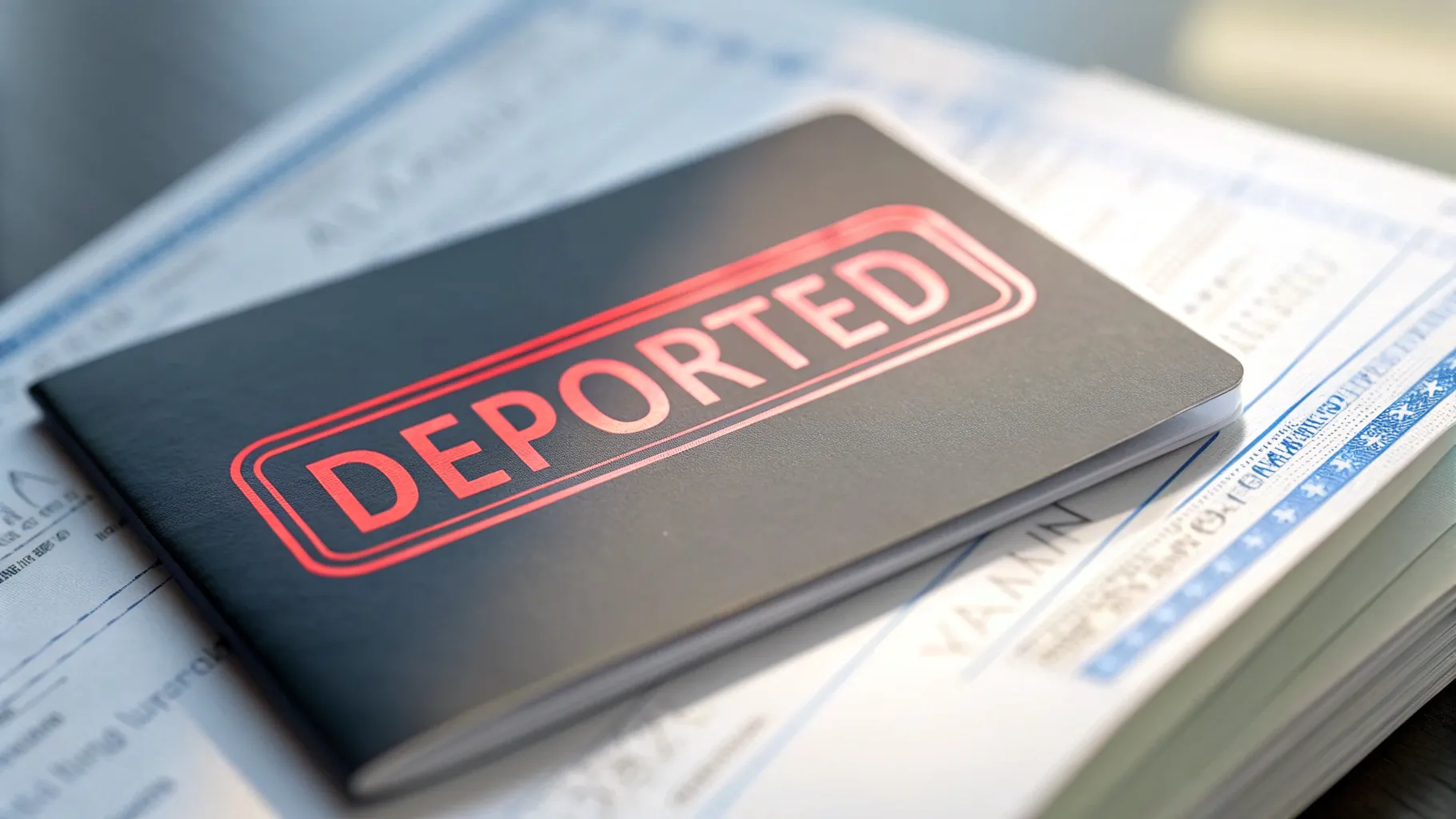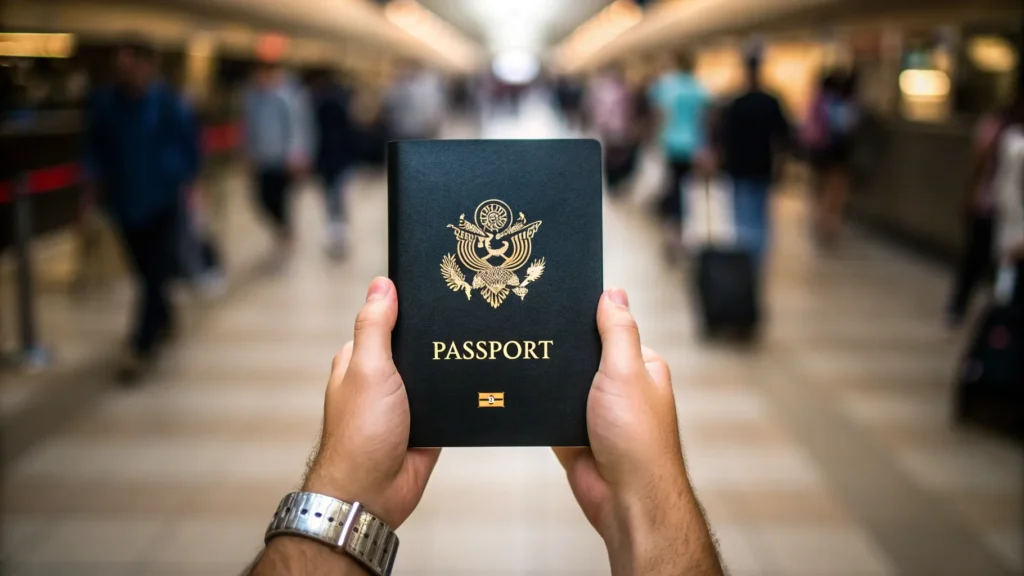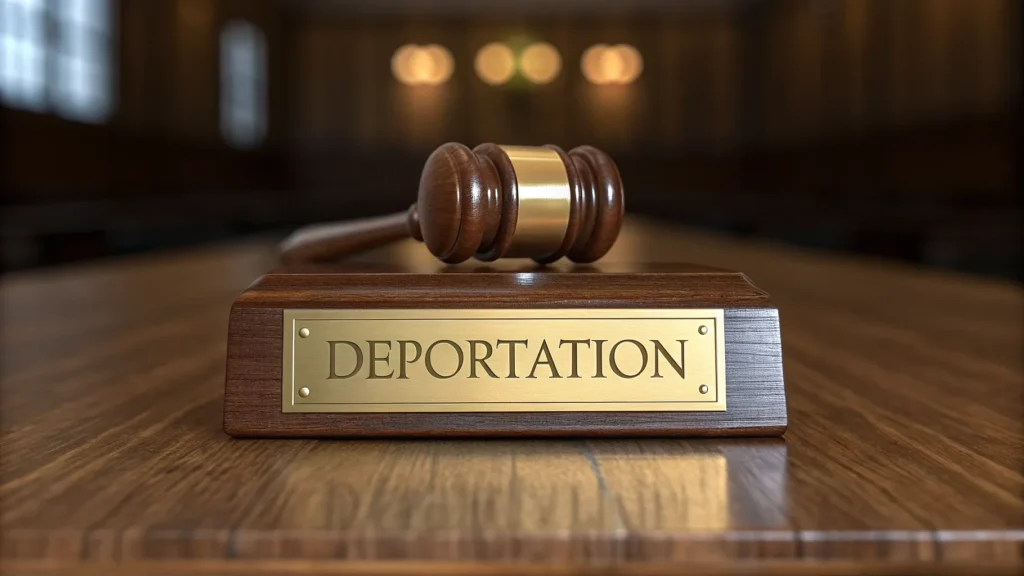What Happens if You Are Deported from Indonesia? Find Out Here!
oktarina
October 18, 2025
12 min read

Have you ever wondered what would happen if you were deported from Indonesia? Deportation from Indonesia is not just about being sent back to your home country; it can have serious consequences. In addition to legal issues, there are also social and professional impacts you’ll have to face. Deportation may also involve legal proceedings, such as investigations or hearings, before a final decision is made.
So, what could happen if you’re deported from Indonesia? The consequences go beyond just losing your visa. You may face difficulties in returning to Indonesia in the future, or even struggles in getting access to other countries. This is important to know if you plan to stay or work in Indonesia. To learn more about the impacts that may arise, read this article until the end!
What is Deportation?
Deportation is the act of sending someone back to their home country by the country they are residing in, in this case, Indonesia, due to violations of laws or regulations. This is usually applied to foreign nationals (WNA) who are in Indonesia without valid permits or those involved in activities that break the country’s rules. Foreigners are subject to deportation if they violate immigration laws or misuse their visa status. Deportation can happen for various reasons, whether due to administrative issues like overstaying (staying longer than the given visa), or more serious violations such as involvement in criminal activities.
In Indonesia, deportation is not a decision made lightly. It is governed by strict regulations under Law No. 6 of 2011 on Immigration. According to this law, deportation can occur if someone is found guilty of serious violations. Indonesian authorities have the right to deport foreigners who violate immigration laws. For example, if someone overstays their visa, works without the proper permit such as a work visa (KITAS), or uses a business visa for work activities (which is not allowed), they can be deported. Using a business visa for employment purposes is a violation and can lead to deportation. Other grounds include engaging in criminal activities like human trafficking, drug abuse, or terrorism.
It’s important to understand that deportation is more than just forced removal. In many cases, a person who is deported may also face additional penalties, such as fines or being banned from entering Indonesia for a specific period. In more serious situations, such as involvement in major crimes, someone could be arrested before deportation and could be banned from entering other countries for several years, or even permanently.
Can Foreigners Be Deported from Indonesia?

Yes, this can definitely happen. Foreigners (WNA) residing in Indonesia must comply with all applicable immigration rules. If a WNA breaks these rules, deportation can be one of the consequences they will face.
For instance, if you arrive in Indonesia on a tourist visa but end up working without the proper permit, this could be considered a serious violation. The Ministry of Manpower and sponsoring companies are responsible for ensuring that foreign workers have the correct permits and are working at the authorized location. Work permits must specify the location where the foreigner is allowed to work, and working outside this location is a violation. In such a case, immigration authorities have the power to deport you. Additionally, if a WNA becomes involved in criminal activities such as drug abuse, financial crimes, or threats to national security and public order, they are also at risk of deportation. These measures are in place to prevent foreigners from causing disturbances or violating Indonesian laws.
Deportation doesn’t only apply to clear legal violations but also to administrative breaches. For example, staying beyond the visa expiration date or failing to extend your stay as required can lead to deportation.
Therefore, it is crucial for anyone who holds foreign nationality in Indonesia to comply with immigration regulations. This is not only to avoid deportation but also to ensure that their legal status remains safe while staying in the country.
Read more: Single Entry Visa: Everything You Need to Know Before Planning Your Trip to Indonesia
Reasons Someone Can Be Deported from Indonesia
Living in Indonesia as a foreign national (WNA) comes with the responsibility to follow the rules and regulations set by the government. If you break these rules, the likelihood of deportation increases. Here are some common reasons why someone may be deported from Indonesia:
- Overstay (Exceeding the Allowed Stay Period)If you stay longer than the permitted duration of your visa or residence permit, this could be a primary reason for deportation. Immigration authorities provide a clear timeframe for extending your stay, but if you exceed this time without renewal, deportation may be the consequence. Overstayers may also be required to pay a fine for each day of overstay as part of immigration enforcement actions.
- Visa MisuseUsing a visa for purposes other than those it was granted for, such as using a tourist visa to work, is a serious violation of Indonesian immigration law. The authorities will view this as abuse of the visa and it could lead to deportation. Failure to comply with visa conditions can result in deportation.
- Involvement in Illegal ActivitiesBeing involved in illegal activities, such as drug abuse, fraud, or other criminal acts, can result in deportation. Indonesia is very strict about dealing with criminal violations, especially those involving foreign nationals.
- Threat to National SecurityIf you are involved in activities that threaten national security, such as spreading radical views or terrorism, this is a strong reason for deportation. National security is always a top priority for authorities, and they will not hesitate to take firm action if there is a threat to the country’s stability.
Suspected violations are investigated by immigration authorities before any action is taken. Immigration administrative action, such as deportation, is the official response to violations after investigation. The processing of these cases can take time, depending on the complexity.
The Deportation Process in Indonesia

Deportation in Indonesia is not something that happens suddenly. There are several steps that must be followed before someone is actually sent back to their home country. Here are the typical stages involved in the deportation process in Indonesia:
- Examination by Immigration Officials
If you are suspected of violating immigration rules or other laws, immigration officers will conduct an examination. During this process, individuals may be arrested if serious violations are suspected. Legal proceedings may be initiated to determine the outcome of the case. This process is designed to determine if violations have actually occurred and to gather the necessary evidence. - Detention at the Immigration Detention Center (Rudenim)
If a serious violation is found, you will be temporarily detained at the Immigration Detention Center (Rudenim). Detainees must provide their passport and other identification documents. This detention is temporary and happens while waiting for the necessary documents and coordination with relevant parties to continue the deportation process. - Coordination with the Embassy
Immigration will then cooperate with the embassy of your home country to arrange the repatriation process. The embassy may assist with the processing of travel documents, such as your passport or SPLP. You may be required to fill out a form to provide details and further information about your case to support the documentation process. The embassy will assist in documentation and ensure that you are sent back to your country properly. - Repatriation to the Home Country
Once all documents and procedures are completed, you will be repatriated to your home country. The cost of repatriation may be your responsibility, or it may be covered by the Indonesian government in certain cases.
Legal and Administrative Consequences After Being Deported from Indonesia
Deportation is not just about being sent back to your home country; it also comes with legal and administrative consequences that can last for a long time, even affecting your life in the future. Here are some legal and administrative effects that typically follow deportation from Indonesia:
- Entering the Blacklist
After being deported, you will go through a process of blacklisting, which prevents your entry into Indonesia for a specific period, usually ranging from 6 months to 10 years, depending on the severity of the violation. This means you will not be able to return to Indonesia during that period, even if you want to visit as a tourist or for other purposes. At the point when the blacklist period ends, you may apply for re-entry. - International Immigration Record
Your name will be recorded in international immigration systems, allowing other countries to know about your legal status. This can make it difficult to apply for visas or residence permits in other countries, as many nations check immigration records before issuing visas. This impact is significant for any citizen, including Indonesian citizens, who may face additional scrutiny or difficulties abroad. - Loss of Residence or Work Permits
If you held a long-term residence permit or work permit in Indonesia, these will be revoked after deportation. This means you will lose the right to reside or work in Indonesia, even if you previously had legal status. - Difficulty in Applying for New Visas
This deportation record will not only affect your relationship with Indonesia but can also cause difficulties when applying for visas in other countries. Countries with strict immigration policies may reject your visa or residence permit applications based on this record.
What to Do If You’re Already Deported?

Although deportation can lead to serious legal and administrative consequences, there are still steps you can take to handle the situation and move forward. Here are some things you can do if you’ve been deported:
- Contact Your Embassy or Consulate
The first step is to contact your embassy or consulate. They can provide various services to assist with your case, including legal assistance and help managing the necessary documents to restore your legal status. They can also offer guidance on how to apply for residence or visa permits again. - File an Administrative Appeal
If you believe there was an error in the immigration process or decision, you have the right to file an administrative appeal. This appeal can be made to request a review of the deportation decision. Be aware that the processing time for appeals can vary, and not all appeals are accepted, so make sure you have sufficient evidence to support your appeal. - Consult an Immigration Expert
Seeking help from an immigration consultant can help you understand your rights after deportation. You can discuss your case with a consultant, who can guide you through the necessary steps and provide legal assistance if needed to rectify your status. - Wait for the Blacklist Period to End
After the ban period ends, you can apply for a visa to return to Indonesia. Make sure you complete all necessary documentation correctly and in line with the proper procedures to increase the chances of your visa application being accepted.
Read more: The Difference Between Passport and Visa You Need to Know Before Your Bali Vacation!
Tips to Avoid Deportation from Indonesia
Living in Indonesia as a foreign national provides valuable experiences, but it also comes with the responsibility of complying with the rules in place. To ensure that you can enjoy your stay in Indonesia without legal issues, it’s essential to keep all your permits and documents in order. Here are some tips for staying legally in Indonesia:
- Check the Expiry Date of Your Visa
Make sure your visa and residence permit are always valid and renew them before they expire. Don’t wait until the last minute, as delays can cause problems with immigration. - Use the Visa for Its Purpose
Always use the visa according to the purpose for which it was granted. For example, if you came for tourism, make sure you use a tourist visa. Don’t use a tourist visa for other purposes like working or doing business, as this violates Indonesia’s immigration rules. - Respect Indonesia’s Laws
Respecting local rules and culture is key to staying comfortably in Indonesia. Every country has laws and policies that need to be followed, and Indonesia is no exception. By understanding and adhering to the rules, you can enjoy your stay without interference. - Use a Trusted Visa Agency
To avoid mistakes in the visa or residence permit extension process, it’s best to use an experienced and trusted visa agency. Many agencies offer tailored services and provide helpful content to guide you through the process. One of the best options is a visa concierge service, which can help manage all your visa and residence permit needs professionally and on time. - Report Any Changes in Data
If there are any changes to your address or status, report them immediately to immigration. Delays in reporting can cause issues later, such as difficulties in extending your visa or during data checks.
Handle Your Visa and Residence Permits with Bali Premium Trip!
Deportation from Indonesia can lead to serious long-term consequences. Not only will you be banned from re-entering for a certain period, but your deportation record will also be added to international immigration systems, which could make it harder for you to apply for visas to other countries. Additionally, if you have long-term residence or work permits, they will be revoked, which can affect your plans to stay in Indonesia or other countries.
To avoid immigration issues that could lead to deportation, it is highly recommended to use a reliable visa concierge service. Bali Premium Trip offers a range of services to assist with visa and permit issues, including a visa concierge service that can help you manage the process of visa extensions and residence permits smoothly and on time. With our deep knowledge of Indonesia’s immigration rules, we ensure your process goes without any hitches. We handles the processing of applications efficiently, minimizing delays and ensuring all administrative steps are completed correctly. For a smooth application process, please provide all necessary details so we can assist you effectively.
Don’t let visa problems ruin your plans in Indonesia. Contact Bali Premium Trip now and enjoy a secure, trusted visa concierge service to ensure your immigration documents are always in order and valid!

Related Article
9 Tips for Enjoying a Holiday in Bali During Ramadan You Must Know!
Bali is always a top destination for anyone looking to...
Bali is always a top destination for anyone looking to travel, including during the month of Ramadan. While a holiday...
10 Halal Tourist Destinations in Bali for an Unforgettable Holiday!
Bali has always been a top choice for many travelers....
Bali has always been a top choice for many travelers. Known for its stunning natural beauty, rich culture, and the...
10 Destinations in Bali That Are Perfect for Visiting During Ramadan
Bali is a top destination for many people looking to...
Bali is a top destination for many people looking to enjoy a vacation, thanks to its stunning natural beauty, rich...



